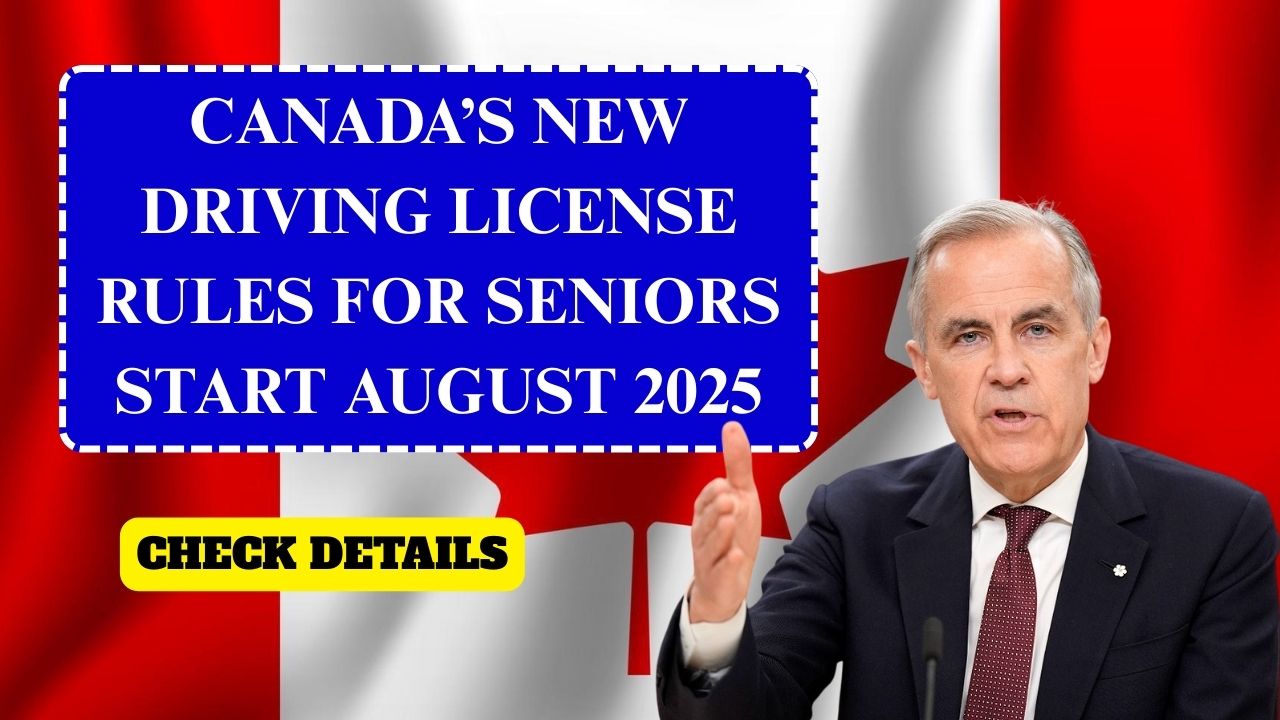Starting August 2025, Canada is introducing new using license guidelines for seniors elderly 70 and above. The aim of those modifications is to balance road safety with independence, making sure that older drivers continue to be secure while persevering with to experience mobility and freedom. With Canada’s getting old populace, provinces and territories are tightening license renewal processes and medical reporting to cope with risks associated with health, vision, and cognitive decline.
This article explains the brand new rules, eligibility updates, and steps seniors need to follow to comply with the upcoming modifications.
Why Are the New Rules Being Introduced?
According to Transport Canada, senior drivers are commonly secure, but age-related health issues—consisting of slower reflexes, vision loss, or cognitive impairment—can boom risks on the street. The new regulations aim to:
- Improve road safety for seniors and all drivers.
- Identify health issues that could impair driving earlier.
- Provide seniors with alternative support, such as shorter licenses or restricted licenses.
- Allow seniors to continue driving safely for as long as possible.
Who’s Actually in Charge Here?
Here’s the primary element to clear up, Ottawa isn’t the only pulling the strings. In Canada, driving force licensing has usually been a provincial and territorial responsibility, no longer federal. That way Ontario comes to a decision its personal device, B.C. Does its very own thing, and so forth. What’s occurring now is a coordinated effort provinces and territories are operating in the direction of a shared framework for drivers over 70.
So no, you won’t see a single law touchdown on July 1, 2025, that magically strips every grandparent in their automobile keys. Instead, you’ll see slow rollouts starting in August 2025, with each province phasing in updates at its own pace.
What the New Rules Actually Do
The updated rules aren’t about banning seniors from using. They’re about making sure anybody on the street is secure—whether or not you’re 19 or 79. For drivers 70 , meaning extra steady take a look at-ins, medical reports, and (in some instances) avenue exams.
Think of it much less like punishment and greater like an annual bodily to your license. A health practitioner may flag slowed reflexes, weaker night time vision, or early cognitive decline—matters that could turn into dangers behind the wheel if omitted. Importantly, if you’re wholesome and pass the checks, you maintain your license. A 72-12 months-old with properly eyesight and sharp reflexes can hold driving just as before.
Key Updates in the August 2025 Rules

The new rules will vary slightly by province, but most Canadian jurisdictions are introducing similar measures for drivers aged 70 and older:
1. Mandatory Medical Reports
- Seniors will now be required to submit a medical fitness report from their doctor every time they renew their license after age 70.
- Conditions like diabetes, heart disease, dementia, or vision loss must be disclosed.
2. Shortened License Renewal Periods
- Instead of a 5-year renewal, seniors aged 70+ may need to renew every 2 years.
- This ensures more frequent health and vision checks.
3. Vision & Cognitive Testing
- Vision tests will become mandatory for every renewal at age 70+.
- Some provinces may also introduce cognitive screening tests to identify memory or judgment issues that could affect driving.
4. On-Road Assessments for High-Risk Drivers
- Seniors flagged for health or vision concerns may be asked to undergo a road test or functional driving evaluation before their license is renewed.
5. Restricted Licenses for Certain Drivers
Instead of losing their license entirely, seniors may be granted a restricted license, which could include:
- Daytime driving only
- Local area driving (within a set radius from home)
- No highway driving
6. Digital License Renewal Options
- Seniors in some provinces will be allowed to renew online, provided they pass medical and vision checks.
- Digital driver’s licenses will also be rolled out in select provinces starting 2025.
What Seniors Over 70 Need to Do
If you are a senior driver in Canada turning 70 or older after August 2025, here’s what you should prepare for:
- Book a Medical Appointment – Ask your doctor to complete a medical fitness report.
- Schedule a Vision Test – Vision screening may be required at renewal.
- Prepare for a Driving Test (if needed) – Seniors flagged for issues can also need to take a brief road take a look at.
- Renew Earlier – Don’t wait until your license expires; begin the procedure at least ninety days before expiry.
- Check Provincial Rules – While these are nationwide updates, every province (Ontario, BC, Alberta, etc.) will publish its very own specific manner.

Provincial Highlights
- Ontario – Already has mandatory testing at age 80, but new rules may expand requirements for drivers starting at 70.
- British Columbia (ICBC) – Will require medical reports from doctors at age 70.
- Alberta – Plans to shorten renewal periods and require medical fitness exams.
- Quebec – Vision and medical tests will be added for drivers 70+.
Benefits of the New System
- Seniors can keep their independence while ensuring they are medically fit to drive.
- Families gain reassurance that their loved ones are safe on the road.
- Road safety improves as high-risk drivers are monitored more closely.
- Restricted licenses give seniors alternatives instead of losing driving privileges entirely.
Conclusion
The new driving license rules for Canadian seniors starting August 2025 mark a significant shift in how older drivers are monitored and supported. Seniors elderly 70 and above will need to undergo medical reviews, imaginative and prescient checking out, and shorter renewal cycles, with additional tests for the ones flagged as excessive hazard.
While some can also see this as stricter oversight, the adjustments are designed to protect seniors, their families, and all street customers. By balancing safety with independence, the machine ensures that older Canadians can continue driving responsibly and optimistically for so long as feasible.
FAQ’s
Is this alteration the same across Canada?
Mostly, but each province will adapt the shared framework in its personal manner and on its own timeline.
Are medical checks loose for seniors?
Depends to your province. Some cowl the charges; others don’t.
Could these new guidelines be challenged legally?
Possibly. Some attorneys assume age-related regulations may face human rights demanding situations, although none have succeeded to this point.


